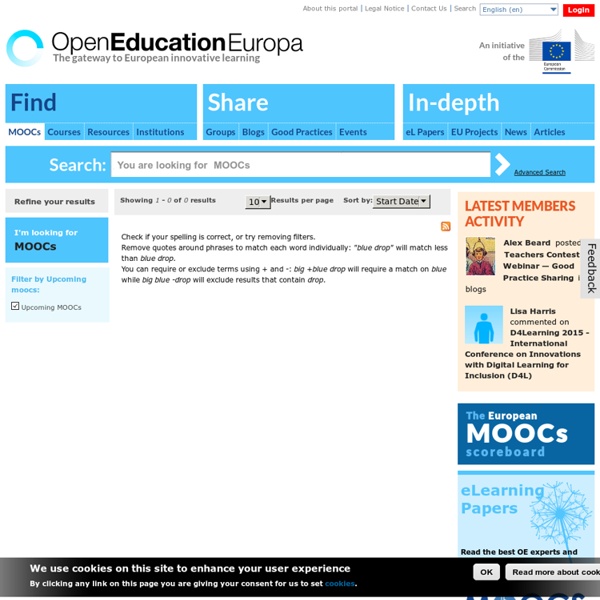Peut-on apprendre en ligne
A TED 2011, Salman Khan est venu présenter la Khan Academy, une collection soigneusement structurée de plus de 2000 vidéos éducatives (voir la présentation vidéo avec sous-titres en français). La Khan Academy connaît un succès notable avec quelques 1 millions de visiteurs par mois qui regardent entre 100 et 200 000 vidéos par jour, souligne son créateur. Salman Khan a commencé incidemment.
MOOC et enseignement à distance : quelles différences ? - Formasup, le portail de la formation à distance
Effectivement quand on regarde les MOOC, ce qui a été rendu possible par la formation ouverte et à distance, version MOOC, c’est « massive », on ne peut pas mettre 16 000 élèves dans une même salle pour enseigner à 16 000 élèves, dans l’amphi on met au maximum 300 étudiants, si je veux avoir 16 000 étudiants dans un amphi ce n’est pas possible, par contre un MOOC c’est possible, et ça s’est intéressant, le côté massif. Et là, bien oui, nouvelle opportunité parce qu’on a cette plateforme, parce qu’on a cette possibilité d’interagir avec un groupe, un très grand nombre d’étudiants. Quand je dis « on a la possibilité », c’est aussi les défis qu’il y a derrière parce qu’il n’est évidemment pas question que chaque enseignant interagisse avec chacun des étudiants, donc les interactions ne sont pas forcément entre les étudiants et les enseignants, mais sont souvent des interactions entre les étudiants eux-mêmes, en tout cas il ne faut pas qu’ils se sentent isolés à l’intérieur du Mooc.
EDUlib HEC Montréal : EDUlib HEC Montréal : EDUlib
Reconnue pour son avant-gardisme, HEC Montréal a été la première en Amérique du Nord à détenir les trois agréments internationaux les plus prestigieux du monde de l'enseignement de la gestion : AACSB International (États-Unis), EQUIS (Europe) et AMBA (Royaume-Uni). L’École accueille plus de 13 000 étudiants dans l'un ou l'autre de ses programmes d'études en gestion, du B.A.A. au Ph. D., et regroupe plus de 270 professeurs.
L’école inversée, ou comment la technologie produit sa disparition
Je vais vous raconter une expérience qui pousse la logique du MOOC, ces cours en ligne ouverts et massifs, jusqu’au bout. Une expérience narrée récemment dans le New York Times par Tina Rosenberg (@tirosenberg), et qui est le point de départ d’un mouvement qui porte le joli nom d' »école inversée » ou flipped school. Tout commence il y a quelques années, à Clintondale, au nord de Detroit, dans une région loin d’être privilégiée. Le proviseur d’un lycée poste sur Youtube des vidéos de tactiques de baseball pour l’équipe de ses fils. Il s’aperçoit que non seulement les jeunes joueurs regardent ces vidéos, mais ils les regardent plusieurs fois… Ils assimilent les stratégies et cela laisse plus de temps, à l’entraînement, pour la mise en application et la pratique. A la rentrée suivante, ce proviseur demande à un de ses enseignants en sciences sociales, de tenter une inversion avec une classe : mettre des cours en ligne et consacrer les heures de classes aux questions et à la pratique.
mooc.org
ALISON: Free Online Courses
Méthodologie de gestion de projets e-learning
Tout projet, quel qu'il soit, gagne à suivre une méthodologie structurée, rigoureuse et cohérente. Les projets e-learning, quelle que soit leur ampleur, n'échappent pas à cette règle Le respect d'une méthodologie de gestion de projets structurée, rigoureuse et cohérente permet d'éviter certains écueils (perte de temps, explosion des coûts, etc.) et de gérer au mieux le processus de développement et/ou d'adoption-intégration de l'e-learning dans la structure organisationnelle. Au début des années 2000 de nombreux contre-exemples ont desservi l'e-learning et masqué son réel potentiel. Ces solutions souffraient souvent d'un déficit méthodologique. Les nouvelles technologies, si séduisantes soient-elles, ne dispensent pas de suivre une méthodologie de gestion de projet.
Advance Your Career Through Project-Based Online Classes - Udacity
European Schoolnet Academy
E-formation
Un article de Wiki Paris Descartes. E-formation (ou ou , e- pour électronique). La Commission Européenne la définit comme « l’utilisation des nouvelles technologies multimédias et de l’Internet, pour améliorer la qualité de l’ apprentissage en facilitant l’accès à des ressources et des services, ainsi que les échanges et la collaboration à distance ». Mode d'apprentissage qui tire parti de l'usage des TIC (technologies de l'information et de la communication) pour tous les niveaux de l'activité de formation ( TICE ). Il désigne plus particulièrement un dispositif de formation ( plateforme d’enseignement , etc) dont les principaux objectifs peuvent être définis comme :
Solve Puzzles for Science
La chronique : l'histoire est-elle soluble dans les MOOCs ?
Associez deux éléments de l’actualité avec d’un côté les commémorations à venir de 14-18 et, de l’autre, les MOOCs et vous avez un duo qui devrait faire parler de lui. C’est ainsi que France Université Numérique (FUN, faut oser!), vous propose son MOOC dédié à l'enseignement de l'histoire — La première guerre mondiale expliquée à travers ses archives [1] — et nous donne l'occasion de faire le point sur la question des MOOCs rapportée à l'enseignement de l'histoire.



J'ai visité ce site la Commission européenne. L'objectif est d’offrir un accès unique à des ressources éducatives libres (REL) européennes en différentes langues afin de pouvoir les mettre à disposition des étudiants, des enseignants et des chercheurs. Dans la section «Trouver», on trouve les MOOC, les cours et les ressources éducatives libres des principales institutions européennes. Site très instructif. Cordialement. Bouchra. by sirsalane_groupe3_sde Apr 10